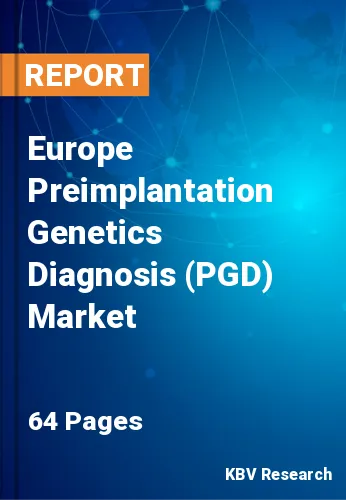The Europe Preimplantation Genetics Diagnosis (PGD) Market would witness Market growth of 9.0% CAGR during the forecast period (2022-2028).
Preimplantation genetic testing is gaining popularity as a reproductive treatment option among persons with sex-linked genetic illnesses, single-gene donors, people with chromosomal problems, older women looking for a baby, and women who have had many abortions. The government has strict regulations that have a considerable impact on the Market . PGD is primarily used to prevent genetic diseases by selecting just those embryos that do not have a known genetic problem. PGD can also be used to increase the chances of a successful pregnancy, match a sibling's HLA type to be a donor, reduce cancer risk, and sex selection. Preimplantation genetic diagnosis also allows for prenatal sex determination prior to implantation, which is referred to as preimplantation sex determination.
Some of the growth catalysts for the Market are an increase in the occurrence of chronic diseases and impairments around the world. Because of the increased prevalence of genetic problems among children and difficulties among the elderly, preimplantation genetic testing is becoming highly popular. According to a survey conducted by Genetic Alliance, one out of every 25 children in the United Kingdom is impacted by a genetic abnormality, with approximately 30,000 babies diagnosed each year. Aside from that, over 500 million people and children in the country suffer from a hereditary illness.
Despite the fact that PGD is now a well-established treatment in several European nations, there is no current, complete independent data on PGD practice and provision in Europe. Patients and/or samples are frequently referred abroad as a result of differences in regulation, legislation, and technical infrastructure between European countries, but data on the extent and type of international movement, as well as access to PGD across Europe, is limited. The importance of complete quality assurance in assisted reproduction clinics, laboratories, and treatment methods has been emphasized, with the idea that European providers should have a formal quality system.
Pre-implantation genetic diagnostics for monogenic or single-gene disorders (PGT-M) can also be used to avert more than 600 genetic problems, according to the UK's Human Fertilization and Embryology Authority. One of the prominent trends in the regional Market is a significant number of late pregnancy instances, which has resulted in a larger adoption of IVF techniques.
The Germany Market dominated the Europe Preimplantation Genetics Diagnosis (PGD) Market by Country in 2021, and would continue to be a dominant Market till 2028; thereby, achieving a Market value of $10,313 Thousands by 2028. The UK Market is anticipated to grow at a CAGR of 8.2% during (2022 - 2028). Additionally, The France Market would experience a CAGR of 9.8% during (2022 - 2028).
Based on Test Type, the Market is segmented into Aneuploidy, Chromosomal Abnormalities, X-linked diseases, Single Gene Disorders, HLA Typing, Gender selection, and Others. Based on countries, the Market is segmented into Germany, UK, France, Russia, Spain, Italy, and Rest of Europe.
Free Valuable Insights: The Global Preimplantation Genetics Diagnosis (PGD) Market Size will Hit $159.8 Million by 2028, at a CAGR of 9.7%
The Market research report covers the analysis of key stake holders of the Market . Key companies profiled in the report include Illumina, Inc., Invitae Corporation, Natera, Inc., Agilent Technologies, Inc., PerkinElmer, Inc., Quest Diagnostics Incorporated, Reproductive Genetic Innovations, PacGenomics, CeGaT GmbH, and Laboratory Corporation of America Holdings.
By Test Type
By Country
Our team of dedicated experts can provide you with attractive expansion opportunities for your business.

